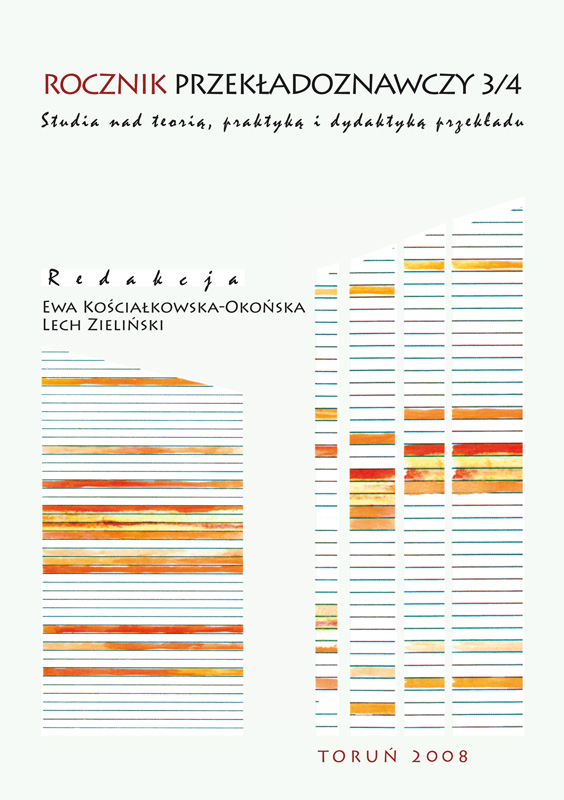Interkulturowość w przekładzie tekstów użytkowych (na materiale rosyjskich i niemieckich tłumaczeń przewodników po Polsce)
DOI:
https://doi.org/10.12775/RP.2008.011Słowa kluczowe
interkulturowość, funkcja języka komunikacyjna, funkcja języka pragmatyczna, komunikacja międzyjęzykowaAbstrakt
W niniejszym opracowaniu omówione zostanie zjawisko interkulturowości, będące wynikiem transferu kultury języka wyjściowego do przestrzeni języka przekładu. U podstaw istnienia tego zjawiska leży heterogeniczność kultur, wzajemnie się przenikających i oddziałujących na siebie. To powoduje, że w tekście przekładu mamy do czynienia z 1) elementami kultury wyjściowej, 2) elementami kultury docelowej oraz 3) elementami kultury trzeciej. Współwystępowanie tych zjawisk jest możliwe dzięki podstawowym funkcjom tekstów użytkowych, z jednej strony funkcji informacyjnej, z drugiej natomiast – funkcji pragmatycznej, mającej na celu zapewnienie skutecznej komunikacji pomiędzy nadawcą i odbiorcą.
Bibliografia
Gd – Gdańsk. Przewodnik kieszonkowy, Wydawnictwo Pascal, Bielsko-Biała 2006.
Danzig. Taschenfuhrer. Ubersetzung, M. Behlert, Wydawnictwo Pascal, Bielsko- Biała 2006.
Kr – Wilkońska, F., Gądek, K., Kraków z Kazimierzem, Krakow [bez r. wyd.]. Wilkońska, F., Gądek, K., Krakov s Kazimezhem, przekład INTERLANG, Kraków.
Wilkońska, F., Gądek, K., Krakau mit dem Stadtteil Kazimierz, przekład INTERLANG, Kraków.
Wroc – Urlich-Kornacka, M., Przewodnik po Wrocławiu, Wrocław [bez r. wyd.].
Urlich-Kornacka, M., Reisefuhrer durch Breslau, Wrocław [bez r. wyd.].
Urlich-Kornacka, M., Putevoditel' po Vrotslavu, Wrocław [bez r. wyd.].
Engel, Ch., Lewicki, R., 2005, „Koncepcje interkulturowości. Przedmowa”, [w:] Interkulturalitat. Interkulturowość, Hrsg. von Ch. Engel, R. Lewicki, Innsbruck, s. 21–31.
Fleischmann, E., 1999, „Die Translation aus der Sicht der Kultur”, [in:] Gil, A., Haller, J., Steiner, E., Gerzymisch-Arbogast, H., Modelle der Translation, „Saarbrucker Beitrage zur Sprach- und Translationswissenschaft ”, Bd.1, Frankfurt a. M. [u.a], s. 59–77.
Skibińska, E., 2004, „W szkole interkulturowości: problematyka różnic między kulturami w dydaktyce przekładu”, [w:] Między oryginałem a przekładem IX, U. Kropiwiec i in. (red.), Kraków, s. 82–83.
Urbanek, D., 2002, „Elementy trzeciej kultury w procesie przekładu”, [w:] Przekład – język – kultura, R. Lewicki (red.), Lublin, s. 59–70.
Pobrania
Opublikowane
Numer
Dział
Statystyki
Liczba wyświetleń i pobrań: 1272
Liczba cytowań: 0



